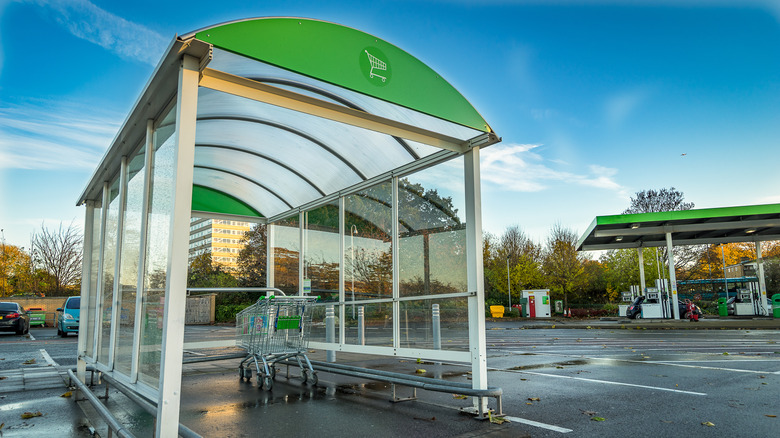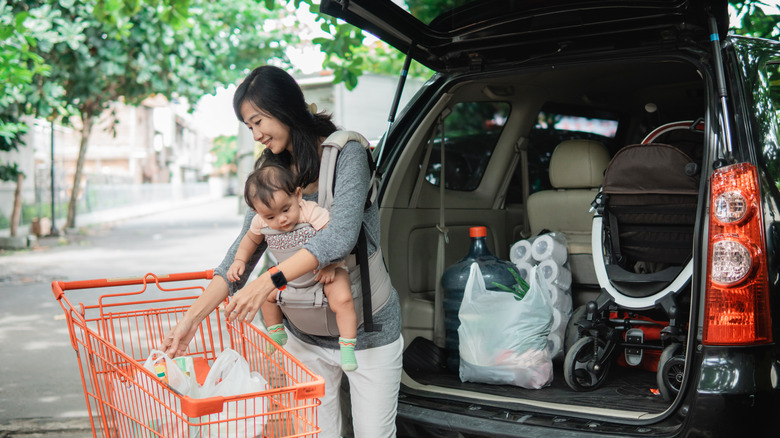So, Shopping Carts Are Being Compared To The State Of Humanity
If a grocery store trip doesn't always feel like a peaceful getaway for you, you're not alone. Different stores have their own guidelines and customs that shoppers have to get used to, and rules of etiquette are hotly debated.
At Aldi, for example, some shoppers feel they encounter a string of stressful experiences, from identifying the generic versions of items on their lists to keeping up with the person at the register. They've taken to the term "Aldi anxiety" to describe what it's like to shop at the budget retailer.
But no topic seems to make grocery customers as heated as carts. Shoppers are losing it over other store-goers leaving their carts in the middle of the aisle while they grab items from the shelves. For other shoppers, letting your 5-year-old push the cart is one of the rudest things you can do at the grocery store.
Shopping carts are also being compared to the state of humanity. A popular theory on social media claims that returning a shopping cart to the parking lot corral is the true test of good moral character — doing small, virtuous things when nobody's watching. However, some people are warning that the "shopping cart theory" might be counterproductive and actually create more discriminatory judgment among shoppers.
Does returning your shopping cart make you a better person?
The shopping cart theory on social media ties the act of returning your cart to humanity's innate ability to maintain and respect social order. Philosophers as far back as Aristotle have claimed that good citizenship and ethical living involve caring for shared property, an idea that's reflected in discussions of grocery store no-nos you might not know you're doing.
"No one will punish you for not returning the shopping cart ... you gain nothing by returning the shopping cart. You must return the shopping cart out of the goodness of your own heart," a common version of one meme reads (via Imgur). A person who doesn't return their cart, the meme continues, is "no better than an animal, an absolute savage."
Food has long been deeply linked with how we view ourselves and, sometimes more importantly, how we judge other people. Just take lobsters or oysters: Now, they're considered fancy, but they were once derided as working-class food. Similarly, shoppers may be quick to judge those who don't return shopping carts when we look at others' choices through the lens of our own experiences.
Here's what does ableism has to do with shopping carts
While returning a shopping cart may seem like a simple task, there are plenty of reasons a person might find it difficult. Many of these realities are not visible to passersby in a parking lot.
Some shoppers, for example, might have kids they cannot leave unattended while they return the cart. Supermarket parking lots are already chaotic, as Redditors know all too well about Trader Joe's, and maybe the cart-return station is too far away. Maybe the weather is bad, or perhaps a person has a disability that makes it difficult to return the cart.
Advocates are increasingly raising awareness of ableism in society, or instances of discrimination aimed at those with disabilities. And food has long been at the center: As the disability rights movement gained momentum decades ago, American restaurants were one of the first places activists urged to become more accessible.
An onlooker may not know a grocery store shopper has a disability; in fact, according to data from Disabled World, about one in 10 Americans have an "invisible disability" that affects their day-to-day life but is not obvious to a stranger. So as society works to become more inclusive, judging people who don't return shopping carts actively runs counter to that goal. Instead of seeing red over abandoned carts, let's give positivity back into the world and push the cart into the corral ourselves.


